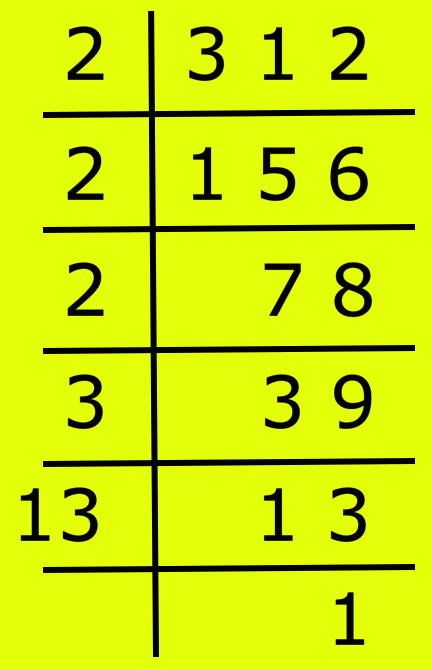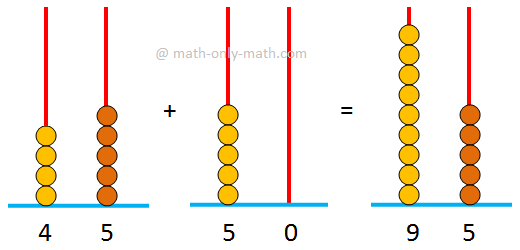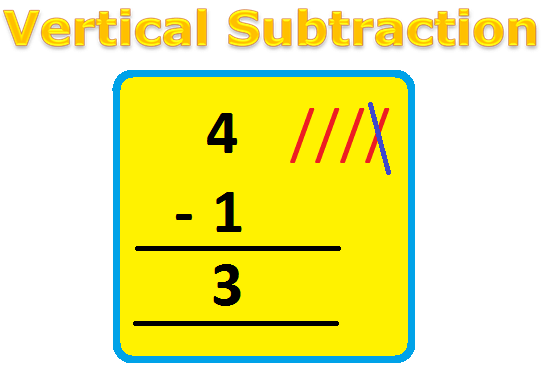Multiplication of Two Complex Numbers
Multiplication of two complex numbers is also a complex number.
In other words, the product of two complex numbers can be expressed in the standard form A + iB where A and B are real.
Let z1 = p + iq and z2 = r + is be two complex numbers (p, q, r and s are real), then their product z1z2 is defined as
z1z2 = (pr - qs) + i(ps + qr).
Proof:
Given z1 = p + iq and z2 = r + is
Now, z1z2 = (p + iq)(r + is) = p(r + is) + iq(r + is) = pr + ips + iqr + i2qs
We know that i2 = -1. Now putting i2 = -1 we get,
= pr + ips + iqr - qs
= pr - qs + ips + iqr
= (pr - qs) + i(ps + qr).
Thus, z1z2 = (pr - qs) + i(ps + qr) = A + iB where A = pr - qs and B = ps + qr are real.
Therefore, product of two complex numbers is a complex number.
Note: Product of more than two complex numbers is also a complex number.
For example:
Let z1 = (4 + 3i) and z2 = (-7 + 6i), then
z1z2 = (4 + 3i)(-7 + 6i)
= 4(-7 + 6i) + 3i(-7 + 6i)
= -28 + 24i - 21i + 18i2
= -28 + 3i - 18
= -28 - 18 + 3i
= -46 + 3i
Properties of multiplication of complex numbers:
If z1, z2 and z3 are any three complex numbers, then
(i) z1z2 = z2z1 (commutative law)
(ii) (z1z2)z3 = z1(z2z3) (associative law)
(iii) z ∙ 1 = z = 1 ∙ z, so 1 acts as the multiplicative identity for the set of complex numbers.
(iv) Existence of multiplicative inverse
For every non-zero complex number z = p + iq, we have the complex number pp2+q2 - iqp2+q2 (denoted by z−1 or 1z) such that
z ∙ 1z = 1 = 1z ∙ z (check it)
1z is called the multiplicative inverse of z.
Note: If z = p + iq then z−1 = 1p+iq = 1p+iq ∙ p−iqp−iq = p−iqp2+q2 = pp2+q2 - iqp2+q2.
(v) Multiplication of complex number is distributive over addition of complex numbers.
If z1, z2 and z3 are any three complex numbers, then
z1(z2 + z3) = z1z2 + z1z3
and (z1 + z2)z3 = z1z3 + z2z3
The results are known as distributive laws.
Solved examples on multiplication of two complex numbers:
1. Find the product of two complex numbers (-2 + √3i) and (-3 + 2√3i) and express the result in standard from A + iB.
Solution:
(-2 + √3i)(-3 + 2√3i)
= -2(-3 + 2√3i) + √3i(-3 + 2√3i)
= 6 - 4√3i - 3√3i + 2(√3i)2
= 6 - 7√3i - 6
= 6 - 6 - 7√3i
= 0 - 7√3i, which is the required form A + iB, where A = 0 and B = - 7√3
2. Find the multiplicative inverse of √2 + 7i.
Solution:
Let z = √2 + 7i,
Then ¯z = √2 - 7i and |z|2 = (√2)2 + (7)2 = 2 + 49 = 51.
We know that the multiplicative inverse of z given by
z−1
= ¯z|z|2
= √2−7i51
= √251 - 751i
Alternatively,
z−1 = 1z
= 1√2+7i
= 1√2+7i × √2−7i√2−7i
= √2−7i(√2)2−(7i)2
= √2−7i2−49(−1)
= √2−7i2+49
= √2−7i51
= √251 - 751i
11 and 12 Grade Math
From Multiplication of Two Complex Numbers to HOME PAGE
Didn't find what you were looking for? Or want to know more information about Math Only Math. Use this Google Search to find what you need.
Recent Articles
-
5th Grade Factors and Multiples | Definitions | Solved Examples | Math
Mar 23, 25 02:39 PM
Here we will discuss how factors and multiples are related to each other in math. A factor of a number is a divisor which divides the dividend exactly. A factor of a number which is a prime number is… -
Adding 2-Digit Numbers | Add Two Two-Digit Numbers without Carrying
Mar 23, 25 12:43 PM
Here we will learn adding 2-digit numbers without regrouping and start working with easy numbers to get acquainted with the addition of two numbers. -
Worksheet on 12 Times Table | Printable Multiplication Table | Video
Mar 23, 25 10:28 AM
Worksheet on 12 times table can be printed out. Homeschoolers can also use these multiplication table sheets to practice at home. -
Vertical Subtraction | Examples | Word Problems| Video |Column Method
Mar 22, 25 05:20 PM
Vertical subtraction of 1-digit number are done by arranging the numbers column wise i.e., one number under the other number. How to subtract 1-digit number vertically? -
Worksheet on 11 Times Table | Printable Multiplication Table | Video
Mar 22, 25 05:08 PM
Worksheet on 11 times table can be printed out. Homeschoolers can also use these multiplication table sheets to practice at home.






New! Comments
Have your say about what you just read! Leave me a comment in the box below. Ask a Question or Answer a Question.